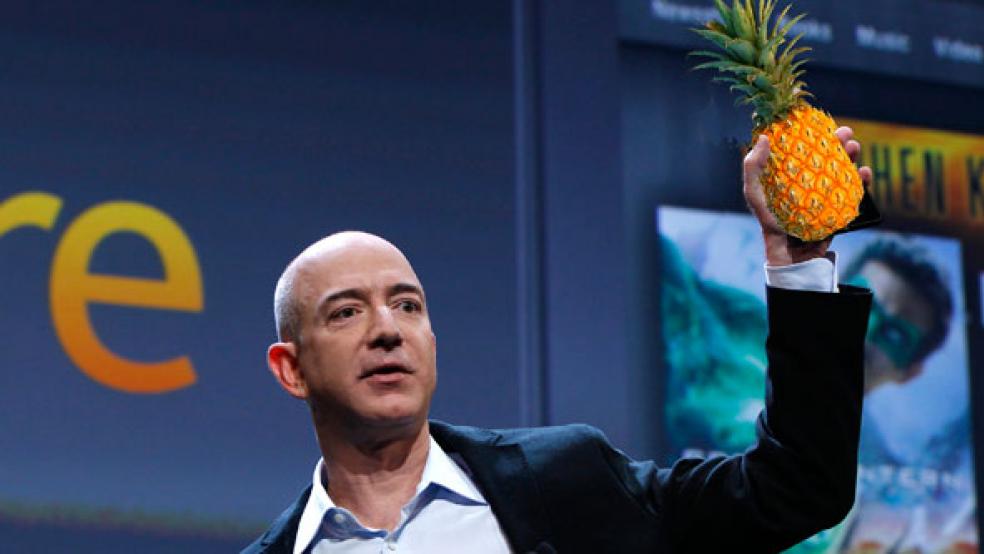Amazon CEO Jeff Bezos has changed the way the retail world operates. He may be about to exert a similar level of pressure on the economy and expectations for future price trends at the supermarket.
At a time when central banks are starting to gird against an expected rise in inflation ahead, Bezos' move to acquire Whole Foods looks to be a significant counterweight.
Related: Whole Foods Offers Something Amazon Really Wants: Data
Analysts expect Amazon to rein in the famously high prices of the upscale grocery chain — "Whole Paycheck," as it is often called — which then could have a ripple effect through the industry.
"Now Amazon is going to reshape the entire food retailing industry and it is highly deflationary — and this is an $800 billion grocery market we're talking about," David Rosenberg, senior economist and strategist at Gluskin Sheff, said in his daily note Monday.
Rosenberg sees "a supermarket war of historic proportions" that will have a significant effect on an industry "that had already been confronted with escalating competitive pressures from the Web as well as foreign entrants."
While some economists disagree that the merger's ramifications will be that dire, it certainly raises questions about how truly disruptive Amazon can be. Should the move put pressure on other chains, Wal-Mart and Target in particular, to lower their prices, it's hard to say where it all could end.
Related: Grocery Stocks Are Reeling as Amazon Gobbles Up Whole Foods
If nothing else, it certainly adds a new wrinkle to the policy debate faced by the Fed and Washington lawmakers.
"We doubt it means much for commodities in the near term, but underscores the changing landscape for how consumers purchase food," David Maloni, president of the American Restaurant Association, said in a note. "Of course, we don't know Jeff Bezos' plans here, but it's highly likely he sees something in food sales that can be disrupted on a massive scale. We live in remarkable times, for sure."
This particular time is seeing the biggest marriage yet between the retail online and brick-and-mortar models.
Bezos already has broken through the barrier somewhat with pop-up stores and its Seattle bookstore. An active partnership with Whole Foods knocks down that wall completely and already is being touted as a new day for the industry.
However, the immediate implications could be less far-reaching.
Related: With Whole Foods, Amazon on collision course with Wal-Mart
Food makes up about 14.6 percent of the Consumer Price Index, a widely used inflation gauge. That's significant, but only about one-third the weight of housing and a shade less than transportation.
For the Amazon-Whole Foods merger to have a true deflationary impact, it would have to set off a chain reaction through the industry, where the other big grocers start knocking back prices to keep up. It's a trend not hard to envision given the influence Amazon has on broader retail pricing, but the timing becomes the question.
"With respect to the Amazon-Whole Foods merger, I think it's premature to anticipate a deflationary surge via grocery prices based on Amazon's ability to ship units of goods to customers," Joe Brusuelas, chief economist at RSM, a middle-market consulting firm, said in an interview. "This is a foray into a highly volatile industry, based on commodity prices, which are immune to Amazon's ability to shape a supply chain."
The Fed's dilemma
That willingness to believe that Amazon by itself cannot spark deflation will be central to the Fed's thinking ahead. Central bank officials have indicated that while inflation readings have been soft this year, the trend will bring the level back to the Fed's 2 percent target next year and justify its current intent to tighten monetary policy.
However, that belief is coming under heavy challenge in financial markets.
"The Fed seems to have a normalization fetish," Bill Miller, the legendary investor and head of the Miller Opportunity Fund, told CNBC's "Closing Bell" on Friday. Miller said he'd rather see the Fed let inflation run high considering the low threat of overheating that current conditions pose.
"The risk is actually asymmetric," added his son, Bill Miller IV. "It's a way bigger risk to go into a deflationary environment than to let the economy run a little hot."
The Fed, though, takes a more nuanced view of inflation than whether a big corporate merger might put downward pressure on prices.
In fact, policymakers tend to be dismissive of the vagaries of food and energy prices, contending they tend to be volatile and their effects transitory, and instead focus on so-called core inflation, which doesn't even take into account the two categories.
That's why the Fed likely will need other signals before it starts tapping brakes on its current policy course.
"We need to be more realistic about how much impact [the merger] could have on food price inflation in the near future," said Jeremy Lawson, chief economist at Standard Life Investments. "It's something to monitor and be observant about, but not something that will affect the near-term forecast for inflation."
This article originally appeared on CNBC. Read more from CNBC:
Facebook spurned Jared Kushner's big tech meeting this week




